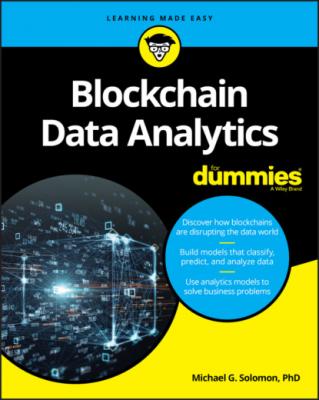ТОП просматриваемых книг сайта:
Blockchain Data Analytics For Dummies. Michael G. Solomon
Читать онлайн.Название Blockchain Data Analytics For Dummies
Год выпуска 0
isbn 9781119651789
Автор произведения Michael G. Solomon
Жанр Базы данных
Издательство John Wiley & Sons Limited
Foolish Assumptions
I don’t make many assumptions about your experience with blockchain technology, application programming, or cryptography, but I do assume the following:
You have a computer and access to the Internet.
You know the basics of using your computer and the Internet, as well as how to download and install programs.
You know how to find files on your computer’s disk and how to create folders.
You’re new to blockchain and you aren’t an experienced software developer.
You’re new to building data analytics models.
Icons Used in This Book
Beyond the Book
In addition to the material in the print or e-book you’re reading right now, this product also comes with some access-anywhere goodies on the web. Check out the free cheat sheet for more on blockchain technology and data analytics at www.dummies.com/cheatsheet/blockchaindataanalyticsfd.
You’ll find summary information about blockchain technology, data analytics models, and extracting blockchain data. The cheat sheet is a reference to use over and over as you gain experience in extracting blockchain data and building data analytics models.
In addition, if you’d rather download the code you see in this book instead of typing it, go to http://www.dummies.com/go/blockchaindataanalyticsfd. You can download zip files for each of the projects you’ll create to develop and test data access and analytics scripts.
Where to Go from Here
The Dummies series tells you what you need to know and how to do the things you need to do to get the results you want. Readers don’t have to read the entire book to just learn about some topics. For example, if you just want to learn about extracting blockchain data, you can jump right to Chapters 5 and 6. On the other hand, if you need to set up your own blockchain analytics lab, read Chapter 4, which tells you how to do that with clear, step-by-step instructions.
Part 1
Intro to Analytics and Blockchain
IN THIS PART …
Using data analytics to drive strategic decisions
Exploring blockchain technology and popular use cases
Examining blockchain data to identify data of value
Building a blockchain analytics lab
Populating a local blockchain with data to analyze
Chapter 1
Driving Business with Data and Analytics
IN THIS CHAPTER
In the twenty-first century, personalization is king — and data makes personalization possible. A good friend can pick out a much more personal gift for you than a stranger because that friend knows what you like and dislike. Marketers have known for decades that establishing a connection with someone can dramatically increase the chances that the person will become a customer. Organizations’ desire to attract customers and increase sales drives the pursuit of meeting consumers’ needs.
Consumers demand personal attention and have come to expect a high level of individualized customer service, online or when physically shopping in a bricks-and-mortar store. Due to advances in consumer interaction sophistication, the bar is high for all types of organizations. For example, it isn’t good enough for web searches to return a general list of responses. Consumers expect their searches to be personalized and filtered based on their preferences. Today’s search engines, and most shopping sites, suggest responses before you even finish typing. It’s almost as if the search function knows you and what you’re about to ask.
The capability to guess what a user is likely to ask or find interesting is based on data. Humans are creatures of habit and most processes (and even natural events) tend to be cyclic. The repetitive nature of behavior means that if you have enough historical data, you should be able to predict what comes next. Expending effort to collect, maintain, and analyze data related to your organization’s operation can help to reduce costs, limit exposure to fines and lawsuits, and lead to increased revenue.
In short, learning how to use your data helps you learn how to make your organization more profitable. In this chapter, you learn about ways that data can provide value to organizations.
Deriving Value from Data
The increased trend toward personalized offerings both depends on data and exposes data’s importance to business operations. Data is no longer simply a consequence of engaging in transactions — data is necessary to increase the volume of transactions. Organizations are learning how valuable data is to their capability to conduct and expand operations. If you want to stay competitive in today’s economy, you’ll have to provide an experience that's responsive and personal. Data from previous transactions makes it possible to

